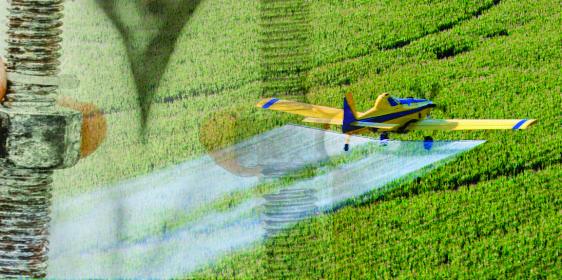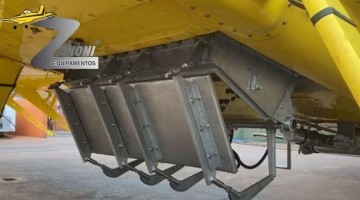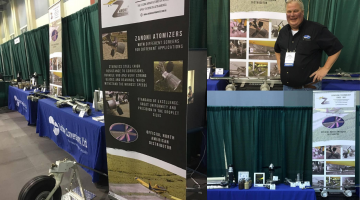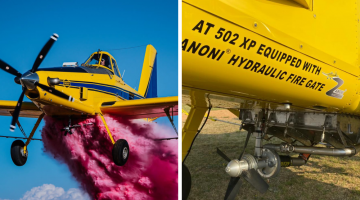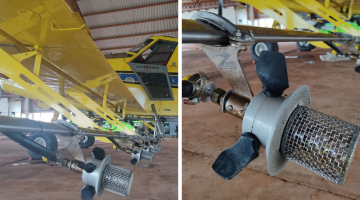During the 1980s, the engineer and founder of Zanoni Equipamentos, Sérgio A. Zanoni, began his career in the ag aviation industry. Working on the maintenance of the Teruel Aviação Agrícola’s fleet, which at the time was one of the largest aerial application companies in Brazil, he soon realized the need for spraying equipments with greater durability. At that time, agricultural aircrafts were all equipped with aluminum spray systems, which, despite being lighter, have low corrosion resistance to agrochemicals.
A few years later, he and his wife Graziela incorporated Zanoni Equipamentos Agrícolas, with the aim of bringing innovations for the agricultural aviation industry through the use of stainless steel equipments. Initially, Brazilian pilots were reluctant to use such products due to their superior weight in relation to aluminum. In a short time, however, Zanoni's equipment fell into graces of the Brazilian market, which soon realized the advantages of the stainless steel use and today practically the entire Brazilian fleet, which has more than 2000 aircraft, uses equipment manufactured with this material. Even on smaller planes, like Ipanema, Cessna and Pawnee, the weight of stainless steel was well accepted, let alone in relation to larger planes like Air Tractor and Thrush.
To give you an idea, there are Zanoni partners with equipment in operation for over two decades, flying every year. For years, our friends used to make jokes like “Sérgio, that way you won't get rich, because we bought the Zanoni product and we will never need to change it again”. Jokes aside, this represents a good part of our work philosophy: offering quality technology that guarantees durability and efficiency in the field, seeking, first and foremost, the satisfaction of the operators.
But the use of stainless steel does not mean an increase in profitability just because of a much longer service life for the spraying system. The high corrosion resistance of stainless steel is coupled with little maintenance and easy cleaning. Time is money (and pest control success) for agricultural aviation, as we all know. With the use of stainless steel, we considerably reduced the problems during the crop seasons, which ended up causing headaches with repairs and losses due to the aircraft being stuck on the ground.
Why is stainless steel the ideal material for use in agriculture?
Products such as fertilizers and pesticides contain sulfates, chlorides and nitrates that punish all the metals that lies ahead, putting at risk the life of the equipment that comes in direct contact with these chemical components.
The last years have witnessed an enhanced growth in the development of chemicals for the use of crop protection. Simultaneously, there has been growth in corrosion by herbicides, pesticides, and fertilizers. Larger scientific studies still need to be carried out to accurately determine the superiority of stainless steel over other materials in terms of corrosion. But, in addition to the evidence in the "real world" related by our partners, there are some studies that also point in this direction.
A research conducted a long time ago by Charles Schreiber (from Dow Chemical Company), which is titled “Corrosion of Aircraft Structural Materials by Agricultural Chemicals”, analyzed the effect of 33 agrochemicals on 29 structural materials, reaching the conclusion that only stainless steel and another specific material “offered complete protection from all solutions investigated” and that aluminum were all destroyed by certain agricultural chemicals. Those include sodium cyanamide, trichloroacetic acid (TCA), liquid fertilizers, 2,4,5-Trichlorophenoxyacetic (2,4,5-T), Water (after a long period of time), Aldrin, Dieldrin, and Heptachlor.
Similarly, in a study entitled “Solutions to Corrosion Caused by Agricultural Chemicals”, Eker and Yuksel highlights that the stainless steel suffered a corrosion from liquid fertilizers 521 times smaller than aluminum and that “of the more common materials, stainless steel is reported to be the most resistant for use with herbicides and pesticides”.
Studies on the corrosion of materials by agrochemicals must be carried out constantly and there is still a great way to find out more about the topic and to develop better technologies. Zanoni Equipamentos constantly invests in research on durability, seeking to offer the highest quality products to agricultural pilots. Over the years, we have perfected the composition of our equipment, keeping an eye on the news in the materials market and the advances in this science. We invite all researchers who are interested in contributing to the subject to share experiences and data with us, maintaining our commitment to always bring innovations that add value to our partners.
